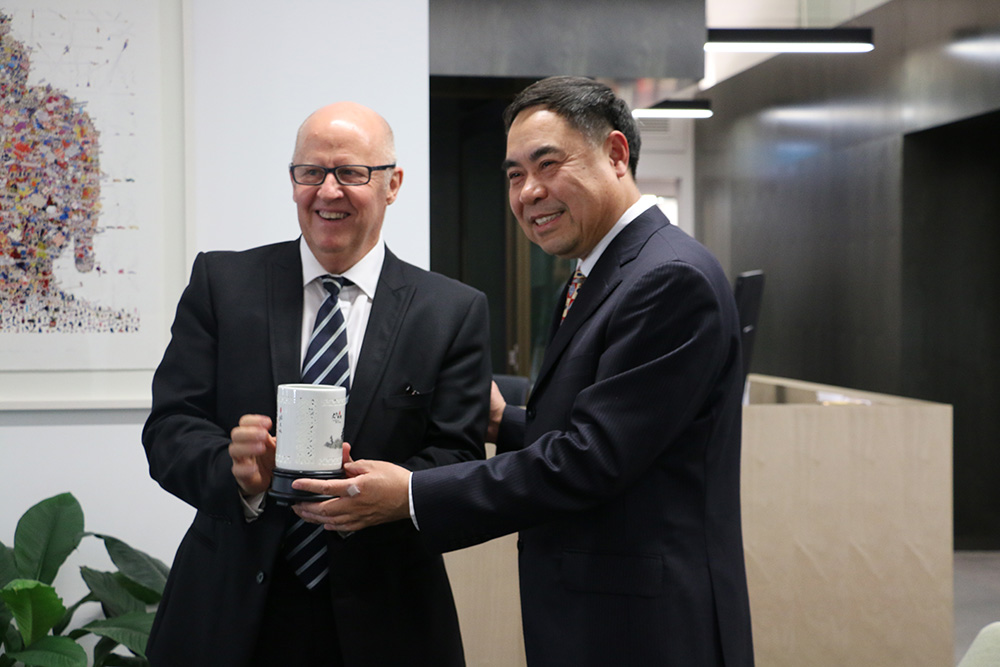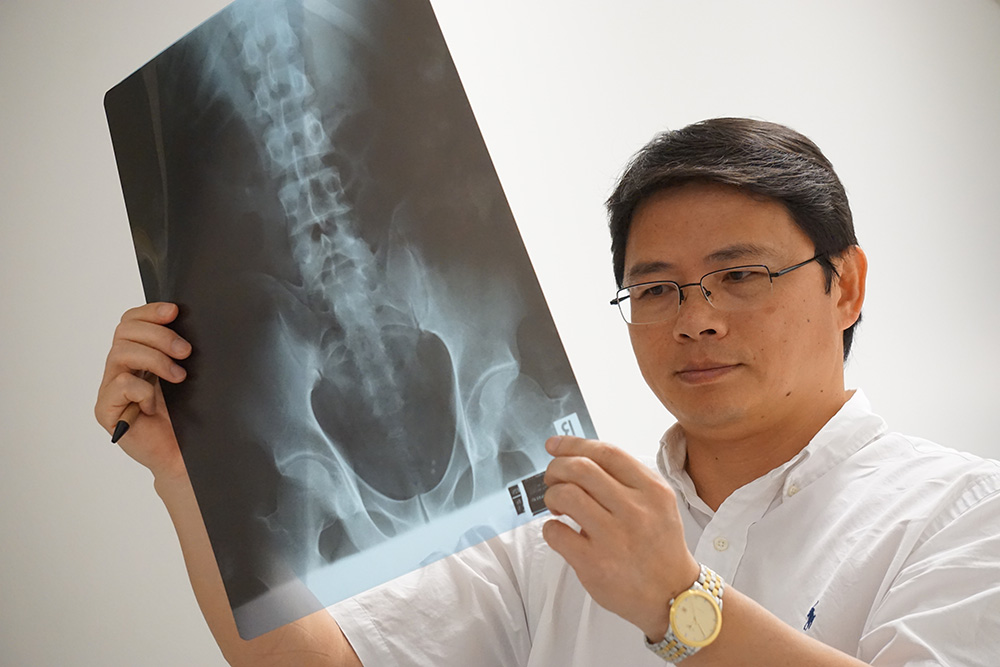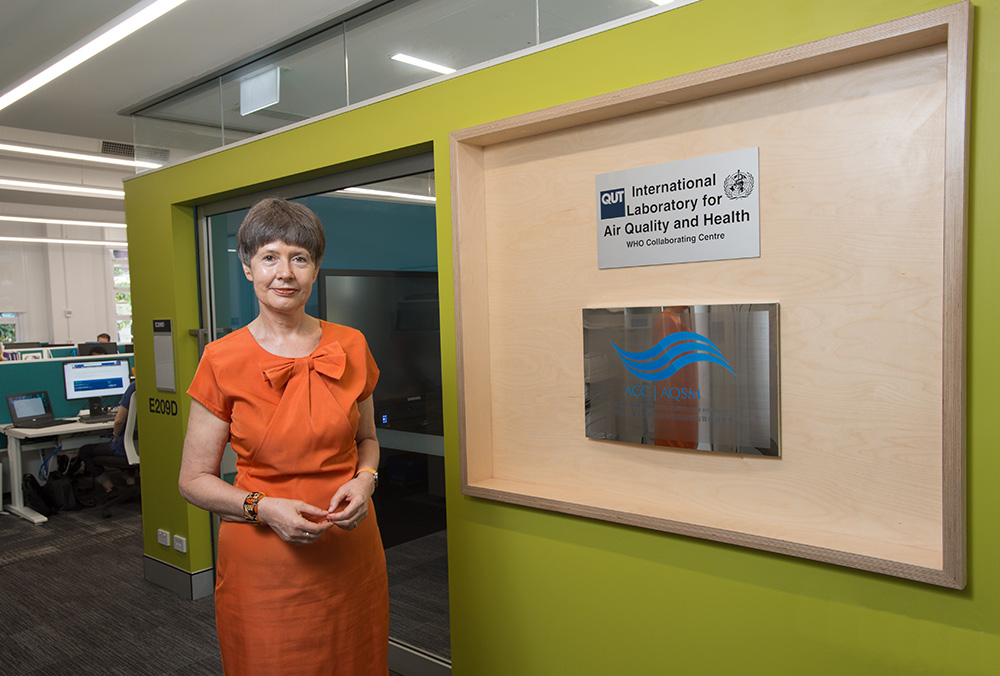Focus on executive management team member Professor Scott Sheppard.
The stewardship of QUT in the international arena is led by our Deputy Vice-Chancellor and Vice-President (International and Development) Professor Scott Sheppard. It’s a crucial role in terms of recruitment and research partnership in an area that can be influenced by the dynamics of international relations and trade.
Professor Sheppard’s immersion into Asia in particular equips him with a unique set of experiences and skills that enable him to help QUT navigate a steady path in a changing environment.
Professor Sheppard’s keen interest in Asia began with an Asian studies degree at Griffith University that provided him with the opportunity to study in Taiwan and then Hong Kong in post graduate studies in Mandarin and Cantonese. A former diplomat Professor Sheppard has represented both Federal and Queensland governments in very different parts of China over the last 25 years, with varied roles including economic reporting, business development and education and science issues.

He has held positions in the Australian Consulate-General; in Hong Kong reporting on the economies of Hong Kong, Macau and southern China, was Minister-Counsellor Education and Science at the Australian Embassy in Beijing where he had responsibility for the bilateral relationship and has also held the business development role of Queensland Commissioner to China in Shanghai.
But even with this wealth of experience Professor Sheppard shies away from being called an ‘expert’ on China. In his words:
"Anyone who’s worked in China for a long time tends to say the things that scare you most is anyone claiming to be a China ‘expert’ because some people go and live and work there for a year and they think they understand it. In my experience after 10 years you realise you’ve only just started to come to terms with complexities of dealing with China. After 20 years you understand it’s a very complex and changing place and that you have just begun to grapple with it. So despite spending almost three decades working in and around China I would not want the label of a China expert and would avoid any one who self-promotes as one! China teaches you many things, humility being a major one."
How does your experience in China assist in your role at QUT?
It provides me with a good understanding of the complexity of how international relations with and between China and other nations works. I have an understanding that a relationship with China is not single dimensional but a connection of engagements at many levels. For QUT we have a very distinct and multi-layered profile in our relationship with China.
What is QUT's profile?
Our profile has three key characteristics. The most obvious part is full fee recruitment – QUT has about 3,000 students from mainland China and that represents about 28 per cent of our international students. Our international students comprise about 16-17 per cent of our overall cohort and this is an intentional lower percentage than other big universities. QUT has always sought to have a better balance in our international cohort and I think we’ve achieved that by being very considered about our weighting.
QUT has grown considerably in the last five years in our research relationship with China and we’ve grown this well and strategically. Our researchers have always had a lot of individual relationships with China but in the last five years we’ve invested strategically in areas where we have real depth and China has a real need.

The third area that has been successful for us is in short courses where we do skills training for people in different professions for example the teaching profession, middle level officials.
What are the key drivers of our international student recruitment from China?
Demand from China is quality and price sensitive and about employability, so we seek to find competitive advantage in our employment rate, costs and how we deliver our student support services.
There is a drive within China for its students to have an international education. But also, China is not a single economy. It’s a massive economy that has many different levels of development, whether it’s along the eastern seaboard, the north east or far west. So when we work in China we try to look at those different areas and calibrate the activities we are doing against that demand. The reality is in some of the big cities like Beijing and Shanghai there is a sophisticated international economy and outlook. The cost of living in those major cities is higher than it is in Australia but very different when you go to the far west and other economically diverse areas.
Another reason why there is demand for quality education options is that the Chinese system will never be able to deliver the type of education outcomes for the entire aspirational population and they know that. So there will always be a demand for students to go overseas although the sophistication of that demand is changing. Fewer students who come from China now wish to stay after their degree as more want to return because the employment prospects for them are much better in China than they are in Australia. There will still be a percentage who seek to apply for migration but that will be less and less. That is change and we’ve adapted to that change in what we do in our marketing and our recruitment profile.
When we look at our international student recruitment from China it’s important to do so in the context of our overall international student recruitment strategy. QUT agrees at a strategic level that the percentage of international students of the cohort could grow by a few percentage points but that will probably occur naturally. We’d like it to grow in a controlled way but with diversity. At the moment we’d have one of the best balances of any of the institutions and we’d seek to maintain that, and that means not being overweight in any one country, whether that’s China, India or elsewhere.
Why is international student diversity important to QUT?
The reason for planning for diversity is as much about the student’s outcome and the students getting what they invest in as it is about mitigating our financial risk in being heavily overweighted in any one country.

We’ve been working on the market opportunities for a number of years in a very joined up way with our colleagues in all faculties and divisions. The things you look at are demographics and economics. We’ve been doing that by working in India for quite a long time. Other parts of south Asia have potential as has large economies like Indonesia and Vietnam where QUT’s been active for a long time. We need to keep that engagement going and invest in how we build it. We’ve also done well in Scandinavian countries like Norway and in other parts of Europe.
What is our research relationship with China?
Our research relationship with China is one QUT can be proud of and one where we can have real impact. China wants the skill sets we have in research because we do a whole range of things that are highly relevant to China’s economic future. Whether it be the tropical research in terms of what our teams are doing in sugar, whether it be some of the robotics work getting the best out of agricultural products, or medical and public health areas – there’s huge demand for that in China and we’re well-placed because of the very practical type of research that we do and do well.
Our role in the central divisions is to help people understand the complexity and to work with them and assist in that relationship building. And that’s what we’ve done. I think we’ve done it reasonably successfully and carefully.

We have two particular success stories in QUT-China collaborative research. The Australia-China Centre for Tissue Engineering and Regenerative Medicine at QUT is a consortia of Australian and top tier Chinese universities that aims to generate interdisciplinary awareness while developing new treatments a range of conditions from wound healing to osteoarthritis and bone defects. Led by Professor Yin Xiao of IHBI, the centre has been very successful in producing publications and being awarded research grants.

The second is the Australia China Centre for Air Quality Science Management, led by Professor Lidia Morawska, which also brings together a number of Australian universities and top tier Chinese research intensive universities to work on very complex problems. Air quality is a huge problem for China and the research we are doing here is highly regarded.

The second is the Australia China Centre for Air Quality Science Management, led by Professor Lidia Morawska, which also brings together a number of Australian universities and top tier Chinese research intensive universities to work on very complex problems. Air quality is a huge problem for China and the research we are doing here is highly regarded.
For our researchers, collaborative projects with China give them access to a scale of activity that we just don’t have. Whether it’s in genetics or medical procedures or air quality, our researchers can get access to data that we will just never generate here.
And China is also investing in the technology to resolve some of these really complex problems like water pollution so they genuinely want assistance with good science and good research and we’re well placed to contribute to that.
Our strategic research relationship with China has been successful in lifting QUTs profile as a research university. It highlights the fact that we have excellent research in cutting edge complex areas.
Is there opportunity for QUT students to study in China?
For QUT students, studying short course activities in China is difficult because not as many of our partnering institutions teach in English and our students, on the whole, don’t speak Chinese. But the study of language is of huge importance for a range of reasons. The minute people start studying another language they become more aware of other cultures and are more empathetic. Chinese is a difficult language but if anyone takes the time to get a proficiency in it, there’s huge advantage for them.
I am a strong supporter of studying any language but if we can then we should also look to the languages of our region. Ideally we should all begin by studying, for example, Bahasa Indonesian – Indonesia is our biggest neighbour, it is a colourful and interesting language. However we are having more of our students take up the opportunity to study in China, if not for full semesters than on a growing number of short term opportunities not just with university partners but also with employers through WIL and other opportunities. This can allow us to get around the issue of language of tuition.
How do you see Asia’s importance to Australia?
The question of the importance of Asia to Australia is a very multi-dimensional one. Starting with our trade relationship with Asia. Australia is a trading nation and openness to the international trade system has been enormously beneficial for Australia. We at times, seem to take it for granted that we are the only economy in the OECD that hasn’t had a recession the past 26 years and that’s been very much due to our terms of trade with our region. Our unemployment and inflation are relatively low but the current potential for a trade war between US and China could have a negative effect on Australia. In the same vein any moves to protectionism by the United States or China or indeed the European Union could impact on Australia. The Australian economy benefits most from an open trading system.
Will international education be impacted by a US-China trade war?
In the undergraduate full fee market, a trade war between China and US probably won’t impact heavily on Australia. If China is impacted in a trade war then yes as there will be less disposable income for parents to support their children to study overseas. That’s probably not going to happen because the Chinese invest in education and do, to a degree, see it as a hedge against uncertainty. The biggest problem for us would be if we were seen as a low-quality education provider and that’s my bigger concern in the medium term, not for QUT, but for Australia.
Our emphasis needs to be on quality outcomes so the Chinese students know that if they invest in us, and get the education they want and a good job at the end of it, they go on to become alumni we’re proud of. If we’re delivering that, then I don’t think there will be a major problem because there will be demand. Our relationship with China will logically continue to grow but the constraints at the political level usually can be worked around. In the research space the opportunities for joint funding with the Chinese system are really significant and good research and good outcomes in things like public health should continue regardless of government relationships.
How is QUT’s long-standing experience in China important?
The China relationship is a complex one and having people who’ve worked there and have a set of existing relationships has allowed us to punch above our weight. QUT has a profile and access in certain parts of China because we’ve been able to build on very long-standing relationships but it’s also multi layered – we work with some of the top-level universities because we do have pockets of excellence, but we also work with others who are really aspirational and we get a flow of students from them because they are moving up in their own system and we benefit from the fact that they draw students from the particular parts of society that will come overseas.
What’s your personal perspective on China?
The rich history and culture of China is fascinating. The other thing is the time scale. You can get lost in this aspect of it but the Chinese think in generations not in decades. There’s a genuine openness to talk about things once you get past the initial barrier. China represents a wonderful opportunity for us as an institution and it has been very good, we just need to not take it for granted and continue to engage and connect at many levels. We do and need to continue to have a mature, positive relationship with China. China’s not going to go away. It’s been around for a very long time. It’s repositioning or reasserting the position it had a hundred years ago and that’s quite natural given its size, complexity and rich, deep history … for Australia we should be there and be part of it. China is very well disposed to Australia.
I first went there in 1981 so it’s been a big part of my career. But I’m not an apologist for China and also I don’t have rose-coloured glasses. It’s got some challenging aspects in terms of a different political system and attitude to human rights. It is also the case that rapid economic growth has come at a cost in terms of pollution, diverse areas of wealth creation and individual rights.
On the other hand China has lifted more people out of poverty than any other country in the history of the world. Over the last fifty years, out of a population now of 1.3 billion there were 800 million people classified as peasants with low life expectancy, very high infant mortality, limited education and living with the real risk of starvation. A significant percentage of these people now have a standard of living that they couldn’t have dreamt of pre 1949. No other country has lifted that many people out of poverty and given them what China sees as a basic human right, the ability to have healthcare, food and not starve to death. They think, ‘once we solve that, there are other things we can move onto’. You can kind of accept that argument when you think of the scale of what they have done in that timeframe. They have been enormously successful, but that’s not without costs which is also acknowledged.
Having gone there over decades I’ve had the real privilege of seeing China change and evolve. QUT does some great things there but we do it modestly.






